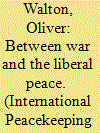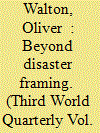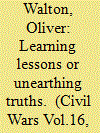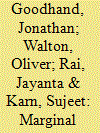| Srl | Item |
| 1 |
ID:
110307


|
|
|
|
|
| Publication |
2012.
|
| Summary/Abstract |
This article explores the interface between international and local approaches to peacebuilding by analysing the experience of two national NGOs involved in peacebuilding work in Sri Lanka between 2006 and 2008. During this transitional period, Sri Lanka's fragile peace process began to unravel. This analysis uses the lens of NGO legitimacy to reflect on the dilemmas and tensions associated with the liberal peacebuilding project and NGOs' role within it. It identifies a critical tension between liberal cosmopolitan and nationalist models of political engagement, which NGOs and the international donors that supported them struggled to negotiate. It argues that NGOs' efforts to reconcile international and local peacebuilding agendas involve uncomfortable trade-offs, and that these processes of negotiation are influenced by NGOs' concerns about organizational survival.
|
|
|
|
|
|
|
|
|
|
|
|
|
|
|
|
| 2 |
ID:
157882


|
|
|
|
|
| Summary/Abstract |
This article examines how and why multi-mandate INGOs represent contemporary armed conflicts in particular ways. Based on empirical analysis of NGO communications and interviews with staff, it finds that these organisations typically adopt a two-track approach to representing conflicts. They use mainstream media to present consequence-oriented accounts to the general public, while utilising alternative channels to represent more nuanced depictions of conflict to more targeted audiences. These alternative forms of communication often aim to disrupt the dominant narratives of conflict produced by influential policy or media actors. Decisions about how to represent conflict are shaped by organisations’ histories, identities and funding relationships.
|
|
|
|
|
|
|
|
|
|
|
|
|
|
|
|
| 3 |
ID:
131761


|
|
|
|
|
| Publication |
2014.
|
| Summary/Abstract |
This article assesses the potential for evidence-informed policymaking in the field of mediation. It argues that one of the key barriers to evidence-informed policymaking in this area is the disjointed character of the existing literature and finds that methodological and theoretical tensions lie at the heart of policy debates around mediation. While differences in theoretical, epistemological and normative perspectives of the existing research have made it difficult for policymakers to draw clear conclusions from the available evidence, the article nevertheless identifies a degree of convergence around certain key themes such as the importance of legitimacy in determining conflict outcomes and the benefits of combining quantitative and qualitative methods. It concludes by highlighting the importance of policy experimentation, evaluation and building capacity for policy learning in mediation policymaking.
|
|
|
|
|
|
|
|
|
|
|
|
|
|
|
|
| 4 |
ID:
180046


|
|
|
|
|
| Summary/Abstract |
In post-war transitions, how do centre-periphery relations change, and what is the role of actors at the margins of the state in negotiating these changes? This article explores these questions by examining Nepal’s post-war transition following the 2006 Comprehensive Peace Agreement focusing on three borderland districts (Saptari, Bardiya and Dolpa). The article analyses contrasting dynamics in these districts to highlight changes in centre-periphery relations across several areas including state reform, the economy, and transitional justice. The analysis shows how post-war transitions often generate new forms of contentious politics, and how groups at the margins can push back against emerging political settlements to reshape politics at the centre. The ambiguities and contradictions inherent to these processes are explored, with state restructuring processes susceptible to elite capture, and re-balancing of power between centre and periphery also coinciding with continuing or increased divisions and inequalities within borderland regions.
|
|
|
|
|
|
|
|
|
|
|
|
|
|
|
|
| 5 |
ID:
115031


|
|
|
|
|
| Publication |
2012.
|
| Summary/Abstract |
This article examines the reputational management strategies of national nongovernmental organizations (NGOs) involved in peace-building work in Sri Lanka between 2006 and 2007, a transitional period when the cease-fire was unraveling and the NGO sector was facing a "crisis of legitimacy." It traces the structural and proximate causes of the crisis and analyzes some of the ways in which NGOs were able to counteract the negative impacts that this criticism had on their legitimacy. This analysis challenges the mainstream view of NGO legitimacy as stable, unidimensional, and capacity-based by emphasizing the contested, highly politicized, and politically symbolic nature of NGO legitimacy in the Sri Lankan context. It also highlights the way in which national NGOs reframed and adapted peace-building agendas of international actors, challenging the popular view that liberal peace building functions hegemonically and that NGOs are compelled to follow the strategies of their international funders.
|
|
|
|
|
|
|
|
|
|
|
|
|
|
|
|
| 6 |
ID:
182565


|
|
|
|
|
| Summary/Abstract |
Existing research on the relationship between alcohol and conflict has focused on displaced populations and viewed alcohol largely as a driver of post-war social problems such as trauma and violence. We draw on qualitative research in Sri Lanka and Nepal to build a more complex picture of alcohol’s role in post-war societies that is attuned to its political economy dimensions and its politically symbolic role. This article develops a comparative and multi-disciplinary approach to demonstrate how narratives about alcohol can reinforce existing processes of social marginalisation and how alcohol can play an important symbolic role in post-war politics.
|
|
|
|
|
|
|
|
|
|
|
|
|
|
|
|